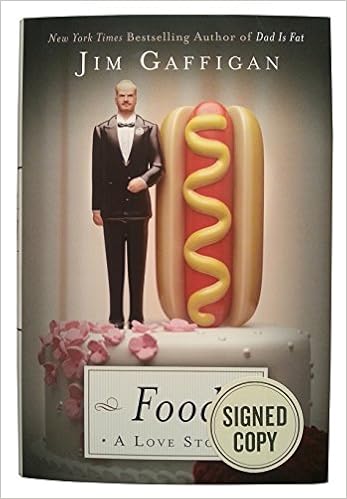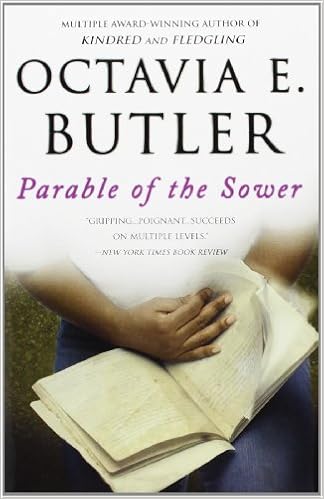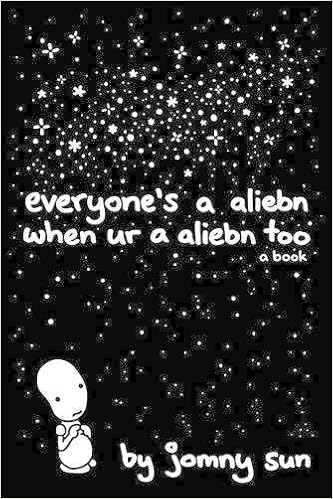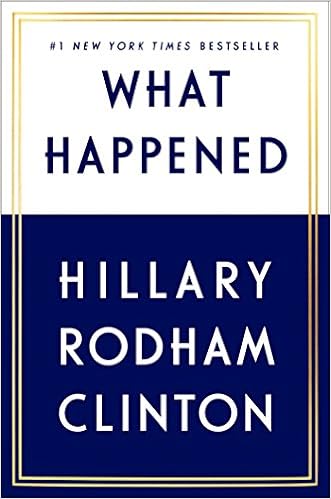book log 2017
1. Today Will be Different by Maria Semple (started 1/1; finished 1/26): B

2. Food: A Love Story Jim Gaffigan (started 1/26; finished 2/18): B-
3. The Princess Diarist by Carrie Fisher (started 2/18; finished 2/25): A
4. Innocents and Others by Dana Spiotta (started 3/7; finished 4/3): B
5. Prince: The Man and His Music by Matt Thorne (started 4/3 ; finished 5/22): B-
6. Parable of the Sower by Octavia E. Butler (started 5/23; finished 6/27): B+
7. Letterman: The Last Giant of Late Night by Jason Zinoman (started 6/27; finished 7/15): B+
8. Theft by Finding: Diaries 1977-2002 by David Sedaris (started 7/21; finished 8/21): A-
9. Everyone's a Aliebn When Ur a Aliebn Too: A Book by Jomny Sun (started 8/21; finished 8/22): A-
10. Believe Me: A Memoir of Love, Death and Jazz Chickens by Eddie Izzard (started 8/24; finished 9/24): B+
11. What Happened by Hillary Rodham Clinton (started 9/24; finished 10/29): B+
12. Waiting for the Punch: Words to Live by from the WTF Podcast by Marc Maron & Brendan McDonald (started 10/29; finished 11/8): A

This was Maria Semple's follow-up to her sensational-to-northwesterners Where'd You Go, Burnadette, which I read, and loved, in 2013 -- that book was published the previous year, but it had such a massive wait list at the library, it took me many months to get my hands on it. The same thing happened with Today Will Be Different, which chronicles a day in the life of an insecure fifty-something mom with a mysteriously, suddenly absent husband and a young boy with a love for makeup. Both novels have a way with skewering Pacific Northwest culture in brilliantly phrased passages, several of which I felt the need to share. That said, Today Will be Different, while an enjoyable read, still felt a little like a "lite" version of the things that made the previous novel great.
2. Food: A Love Story Jim Gaffigan (started 1/26; finished 2/18): B-

If you know comedian Jim Gaffigan, you know he loves food. His fame is derived almost entirely from his "Hot Pockets" but from roughly a decade ago going viral, and his standup comedy tends to be almost exclusively about food. His first book, Dad Is Fat, which was better, covered more of his family and life as a comedian; this book literally is just a series of short chapters on his thoughts on all manner of different kinds of foods. This one is a pleasant enough diversion and got a few good chuckles out of me, but ultimately was also relatively forgettable. It was something to read at the time and that's about it.
3. The Princess Diarist by Carrie Fisher (started 2/18; finished 2/25): A

To what degree, I wonder, was the timing of my reading this a contributor to how much I truly, truly loved it? The critical consensus seems to be a little more mixed than how I responded personally, reading this book that was published just before Carrie Fisher died, only about a month and a half later. I read reviews that found this book disappointingly lacking in insight, and I found it to be quite the opposite. The passages that directly excerpt from the diaries Fisher wrote during the filming of the original Star Wars are quite surprisingly articulate and self-aware for a 19-year-old woman of the seventies clearly informed more by her inexperience and insecurities than anything else. Of course, it's also fascinating to read about her brief affair with Harrison Ford, revealed for the first time with the publication of this book. It's the central idea around which all of the content revolves, whether it's the diaries themselves or the large amount of modern-day thoughts Fisher also shares about it. And this makes sense, given there is little else to talk about in regards to the content of the diaries. That said, she also shares several poems she wrote at the time, and they really spoke to me. They made me wish she had published a volume of poetry. This book, as much as anything else she has contributed to pop culture, reveals Carrie Fisher to be an almost stunningly clever and talented writer.
4. Innocents and Others by Dana Spiotta (started 3/7; finished 4/3): B

I can't remember where I first heard about this one: Entertainment Weekly? One of the many podcasts I listen to which regularly have authors on as guests? Either is equally plausible, but in any case, the premise was clearly right up my alley: it's about two women who have been best friends since middle school and each grew up to be filmmakers: one a documentarian and one a more mainstream (yet slightly subversive) director of narrative films. There's something a little unoriginal about each characters' fimmaking ideas -- the timing of presenting the notion of making commonly male-centric movies from a female perspective seems especially suspect. (Spiotta doesn't say this character directed the female Ghostbusters, but she almost might as well have.) That said, the two wind up briefly crossing paths with -- and one of them ultimately makes a movie about -- a third woman, who became legendary after years of cold calling Hollywood execs and wooing them by voice only, until they got too attached to her and she bailed. The narrative shifts regularly between each of these three women, that last one being by far the most interesting (a medical condition temporarily blinds her), and their story lines do not directly intersect for some time. And although the depth of the friendship between the other two women is never adequately plumbed, it comes close by the end, and the story overall is flawed but always interesting and engaging.
5. Prince: The Man and His Music by Matt Thorne (started 4/3 ; finished 5/22): B-

This reads more like an admittedly well-researched (arguably over-researched), book-length editorial than a biography that makes even any attempt at appearing objective. Even the many footnotes -- frustratingly collected in the back of the book so you constantly have to flip to the end, which I find very annoying -- are riddled with editorial asides and outright conjecture, offering personal opinion as something to be taken on its face, as though you're listening to a friend whose opinion you trust. Making things even more problematic is that all of this is presented within the narrow confines of Prince's music, to the pointed exclusion of his personal life (which I really wanted to read more about), ostensibly out of respect for Prince's own wishes on that front, given his famously private nature. Except, of course, much of the conjecture regarding the production of his music relies on suppositions of the thinking behind Prince's compositions and how his personal life and relationships informed them.
That said, there is still much to be learned from this book, at least by the ardent Prince fan. Consider how Thorne starts on page 1 of Chapter 1: There are four main strands to Prince's music: first, the official releases, from his 1978 debut For You to 2010's 20Ten [this was actually followed by three of his best albums in ages before Prince's death, actually ending with 2016's HitnRun phase two, and two of which are indeed discussed in the epilogue to this 2015 updated edition], including not only the studio albums and singles, but also myriad remixes and maxi-albums, often with as many as six or seven variations on the original track; second, the unreleased songs which have kept several bootleg labels afloat for decades, now so multitudinous that labels can put out collections that would take weeks to listen to and still not exhaust the material in circulation; third, the live recordings: two official releases -- the One Nite Alone . . . box set and 2008's Indigo Nights -- and literally thousands of bootleg recordings, including several versions of the same show in various fidelities; and fourth, the songs he has given to other artists and protégés, from Sue Ann Carwell in 1978 to Bria Valente's Elixir in 2009.
And Thorne exhaustively examines all four of these strands, although any Prince fan with an equal level obsession with all four would be in a small minority indeed. I always considered myself a huge fan of Prince, and yet I have only ever engaged with the first strand, and even there only the first half as Thorne states it: I only ever concerned myself with Prince's official album releases -- and even then only the ones you could find sold at music stores (thus, I never procured any of his releases made available exclusively online, which I am certain are sub-par anyway). Even taking only these official releases into consideration, Prince's proliferation is unparalleled, having released an album an average of once every year between 1978 and 2016. That was always more than enough to contend with, in my view, and unlike with the likes of Madonna or Tori Amos, I therefore never bothered with Prince's extended maxi-singles, with the exception of "The Most Beautiful Girl In the World," and that was only because it was released long before it was made known any version of the song would be on 1995's The Gold Experience. In any event, only a quarter of these "strands," as Thorne describes them, has much relevance or particular interest to me, leaving a lot of information covered to which I have relative indifference. The multiple chapters focusing on his protégé projects are especially dull. And mind you, all of these strands are presented with the same level of editorial conjecture. Indeed, by page 372, referring to director Kevin Smith's aborted documentary project Prince attempted to commission from him, Thorne reveals himself to be a legitimate asshole about it: "I approached the director to give a more considered description of his experience with Prince, but he was too busy podcasting and making terrible films for dwindling audiences and declined (politely), so I am left with the way he presents Prince in front of fans for laughs."
Prince was a clear musical genius who simply didn't know how to edit himself. If he had pared down his releases to once every few years, probably nearly all of his albums -- even during the mid-career slump that lasted upwards of a decade and a half -- would have been brilliant. Do we really need to hear everything in his famed "Vault"? Matt Thorne obviously thinks it would be nice. After the huge dump of excessive information that is this book, none of it personal enough, I'm not so sure.
6. Parable of the Sower by Octavia E. Butler (started 5/23; finished 6/27): B+

I love me some dystopian fiction! Except Parable of the Sower is unsettling in its plausibility: written in 1993 but set between 2024 and 2027, we are now much closer to the setting of this world than we were when this was first published. And although it's hard to see the world degraded to this degree in just the next ten years, it's still incredibly easy to look around our world now and see how easily -- and quickly -- we could get to this. Climate change exacerbates poverty to such a degree that state lines are treated the way we currently think of international borders; a "gated community" means people simply keeping fencing around their neighborhoods to keep out inevitable looters and scavengers, not to mention the pyromaniac drug addicts. Roughly half the book has its protagonist, a young black woman barely entering adulthood after some very useful survival training by her father, leading a fledgling community of desperate almost-hopefuls on a quest north through California, maybe to northern states where there is thought to be more water and perhaps more employment. This book is filled with guns and misery and death, and although it has a lot in common with Cormack McCarthy's The Road -- or I suppose it's The Road that has a lot in common with this, as the latter was not published until 2006 -- I found this a much easier read. The Road left me seriously disturbed for weeks due in large part to its oppressive hopelessness until the very last page; this one, by contrast, is infused a kind of defiant hopefulness throughout, a young woman and her small group of followers keeping on in spite of the worst travesties imaginable. It's honestly not quite as well written, but it comes relatively close -- and in one key way is better, in that it's far more believable. It's also particularly significant as a novel not just with a black woman as its protagonist, but written by a black lesbian.
7. Letterman: The Last Giant of Late Night by Jason Zinoman (started 6/27; finished 7/15): B+

When it comes to late night talk shows, Letterman was always my favorite. I was too young to have any knowledge of his 12:30 show, Late Night with David Letterman, that ran in the eighties -- I was 17 years old when he moved to compete with The Tonight Show (after an infamous "late night war" to replace Johnny Carson as its host) at 11:30 in 1993. But I enjoyed him then, and by the time I moved to Seattle in 1998, before I got my first Seattle job, I spent at least three months staying up to watch him every night. This book characterizes his nineties period as perhaps his weakest; I had no context for comparison. Whatever "eras" he might have had, I always found him to be decisively different from any other late night talk show host. His sarcasm and biting wit were always more my style. I always thought he was funny. But this book provides a lot of that missing context, and it is illuminating -- most notably in how it demonstrates that no star is made a star on their own. This was especially the case with Letterman, if this book is to be believed: he had a reputation for being unconventional, and the credit there goes to the people who worked with him. Letterman himself, apparently, always wanted to be more conventional, and appeal to as broad an audience as possible. He had a notorious temper and resisted a lot of the most original ideas on his show presented by writers and producers. Ironically, the symbiotic relationship between him and those who pushed him was what created the singular show he hosted. Letterman: The Last Giant of Late Night is slightly disappointing in how little it truly gets to the man's inner psyche; even in a wholly authorized biography -- for which he granted several interviews -- he somehow still maintains an emotional distance. But, that was always his brand.
8. Theft by Finding: Diaries 1977-2002 by David Sedaris (started 7/21; finished 8/21): A-

Here is a book with no narrative arc whatsoever, and the amazing thing about it is it's still easily one of the best books I've read all year. David Sedaris went on The Late Show with Stephen Colbert and told him this collection of select diary entries from the first fifteen years of his keeping them was whittled down from the equivalent of about 46 books the same size. What this means is that Theft by Finding is a genuine triumph of editing, a showcase of Sedaris's best and most acute observations, and his satisfyingly caustic humor. I laughed out loud on nearly every page of this book, which might be even better than some of his deservedly celebrated collections of essays. And that's really saying something. I could not recommend this book enough.
9. Everyone's a Aliebn When Ur a Aliebn Too: A Book by Jomny Sun (started 8/21; finished 8/22): A-

Here is a book you can finish in less than an hour. The most effort you have to put in is by buying it, or as I did, getting it from the library. This author became well-known with this quasi-alien persona on Twitter; I actually never followed him, but decided to check out the book when so many others I follow on Twitter raved about it. And to call this book lovely would be an understatement; rarely is anything so effectively charming while also focusing on loneliness, sadness, and particularly feeling – pun intended – alienated. It’s basically a short graphic novel, which is why it’s such an easy, quick read. The illustrations are done with simple lines, and yet their overall effect is surprisingly complex, with real emotional resonance. Reading this book is like getting a literary hug. I read it in two bursts two nights in a row, just in an attempt to stretch out its effects. And it resonated in a peculiar way with me, reminding me so strongly of someone I know that I decided to purchase it and have it delivered by Amazon to their work (the only address I had, as I did not have a forwarding home address), sent anonymously. I could easily flip through this book again and enjoy it just as much the second time around.
10. Believe Me: A Memoir of Love, Death and Jazz Chickens by Eddie Izzard (started 8/24; finished 9/24): B+

Eddie Izzard is a unique figure if there ever was one -- a hilarious surrealist comedian on top of being a successful character actor, all coinciding with being easily the most famous (if not the only) openly transvestite entertainer in the world. Now of course he uses the word "transgender" more commonly, but the somewhat dated term works better for his self-description as a "blokey bloke" who happens to like dressing in women's clothing as an "action transvestite." And the trily wonderful thing about him is that not only is his being transgender but a fraction of the many sides to his persona -- but he's actually been successful at making that the case in the perception of his fans. To call Eddie Izzard one of a kind would be an understatement, and his memoir is fascinating no matter what part of his life he's talking about -- from his birth in what is now Yemen with a father who worked for British Petroleum, to losing his mother to cancer at the age of six, to the massive number of marathons he's run in recent years for charity. He devotes all of a couple of chapters to his standup career, and those are compelling indeed. But the rest of the book is no less so.
11. What Happened by Hillary Rodham Clinton (started 9/24; finished 10/29): B+

Although I did find great value in reading Hillary Clinton's previous book, Hard Choices, in 2015, I still found it, at the time, to be a comparatively dry read -- so much so that I had to check it out of the library four separate times before I could get all of its 656 pages read. It didn't help that the book was so overtly calculated in its phrasing in virtually every sentence, so careful in its unspoken promise of then-unclaimed political ambitions.
In What Happened, there's still a little of that -- and, on occasion, even I found myself thinking, This smells a little like bullshit -- but it's a far more engaging and personable read. I did have to remind myself that everything I was reading was being filtered through one woman's biases, and that I couldn't necessarily take everything she said at face value. Still, she makes a truly compelling case for what actually happened in the 2017 election based on what information and knowledge she had at the time of publication (in this case, September 12). How you respond to this book will range wildly depending on how you already feel about Hillary Clinton. As far as I'm, concerned, she may be a calculating person, but she's a good person, and has been treated with blatant double-standard unfairness for going on three decades. I was glad to see her address that here, with humility and without harping too much on it.
That said, I do think you should be warned: true specifics of her own personal experience takes a while for her to get to. At least half the book focuses on a macro view of all the contributing elements to how she lost the election, from shifting attitudes among an increasingly disenfranchised electorate to, of course, Russian interference and the clear amount of evidence of it. It's all important information, but it's far from what makes the book the most interesting. She spends one chapter, in the latter half, describing her own personal experience of election day itself, and that chapter is truly riveting. I wish the rest of the book had a similar focus, but I still found all of it more compelling, and even all that other stuff still read better -- as in, less dry -- than her previous book did. This one has 512 pages, and I only had to check it out once! Okay, I did return it several days late, but still.
12. Waiting for the Punch: Words to Live by from the WTF Podcast by Marc Maron & Brendan McDonald (started 10/29; finished 11/8): A

It's kind of like comparing apples and oranges considering the only other solid-A book I read this year was Carrie Fisher's The Princess Diarist, but Waiting for the Punch wins for Best Book Matthew Read in 2017. It's difficult to say how different the impact might be for readers who have never listened to the WTF with Marc Maron podcast, most of whom will never even hear about this book, let alone read it -- but I honestly don't think it would make much difference.
This is a book unlike any other, a sort of transcribed oral history, excerpts from Marc Maron's eight years of recorded conversations, with countless comedians (who dominated the early years), actors, directors, musicians, a few authors and even -- quite famously -- one sitting president. The chapters are separated by theme, such as "Growing Up," "Sexuality," "Failure," "Success," or "Mortality" (among others), and they all contain the most compelling words offered by all these people, always off the cuff in a way that gives the reading experience a unique sensibility. It's expertly edited and organized in a way that makes it easy to keep reading, hard to put down. Sometimes it's heartbreaking, and often it's laugh-out-loud funny, and it's regularly moving. It's fascinating to experience how insightful people can be when sharing their thoughts in an unfiltered, unguarded way, and they don't necessarily even realize the depth of what they are sharing. I just can't say enough good things about this book.
[older book log posts]
